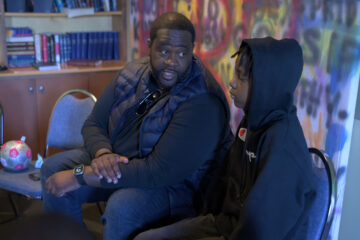Meeting People Halfway
This month let’s talk about meeting people halfway. Henry Boye is quoted as saying, “The most important trip you might take in life is meeting people halfway.” Meeting people halfway implies compromise. How do you feel about compromise?
A bully (adolescent or adult) tries to avoid any compromise intending instead to roll over others regardless of the ethics or appropriateness of the situation. A wise person knows that win-lose situations are really a lose-lose event because the person or group that thinks they won by being the bully only had the edge because of physical or psychological force. The wise person also knows the difference between principles and preferences, between what is really important and what is less important. A wise person knows that the situation afterward is more important than claiming victory. To arrive at the best end point when we differ, it is important to be willing to compromise, to enter into negotiation. A successful negotiation ends up being a win-win situation. However, negotiation requires knowing what is really important to each party. The wise negotiator knows the difference between principles and preferences. We should never negotiate away any of our principles but we should be willing to negotiate our preferences beginning with the least strongly held of our preferences.
Our goal then is not to defeat the other person or group because a win/lose situation tends to be a solution that will soon come unglued with unpleasant activities associated. If we can find a win-win solution in which both parties might give up preferences but not principles, we might have a lasting end point.
But both parties to the difference must know their principles and their preferences and be able to distinguish between the two. When we hold tight to a preference thinking that it is a principle, compromise becomes much more difficult. If one side concludes they do not have any principles involved in the disagreement, that side might wish to withdraw from the situation and save their efforts for the time when they can be more fruitful. Further, with a focus on personalities or words said instead of a suitable end point, compromise is hindered.
So, meeting people halfway, or at least part of the way, means first, knowing what is really important to you, what your principles are as well as what your goals are. This means you have to be able to tell the difference between a principle and a preference. Second, it means identifying as much as possible what the other person or group’s principles and preferences are and, as clearly as possible, distinguish the difference. For example, when you know something is a principle to others but only a preference to you, a negotiating point has been identified. By knowing this, it paves the way toward exchanging issues so that both parties gain what is most essential. Third, it means to identify the preferences you have that would have the most meaning for those with whom you are compromising. The ideal is that one of your preferences is a principle for the others. By identifying preferences on both sides, the area of negotiation becomes clear. Once others see that they are being met halfway, they are more likely to come halfway themselves. Once this happens, compromise is possible.
The two sides could be a wife and a husband, two brothers, a parent and child (of whatever age) or other individual differences as easily as two organizations. God wants us to live in peace and love. In order to have peace and love, we must seek ways to accept others as they wish to be seen and to find common ground with them. What can you do to meet others halfway?
STUDY QUESTIONS
MEETING PEOPLE HALFWAY
The primary purpose of the study questions is to help the listener/reader to more fully grasp the significance and implications of the topic
1.Do you know the difference between your principles and your preferences?
2.Are there issues in your life on which you need to meet others halfway?
3.Look at Scripture passages that tell us to seek peace and love with all of mankind. Which passage is the most meaningful to you?
Kenneth Oosting, Ph D, email Dr. Oosting – [email protected]














